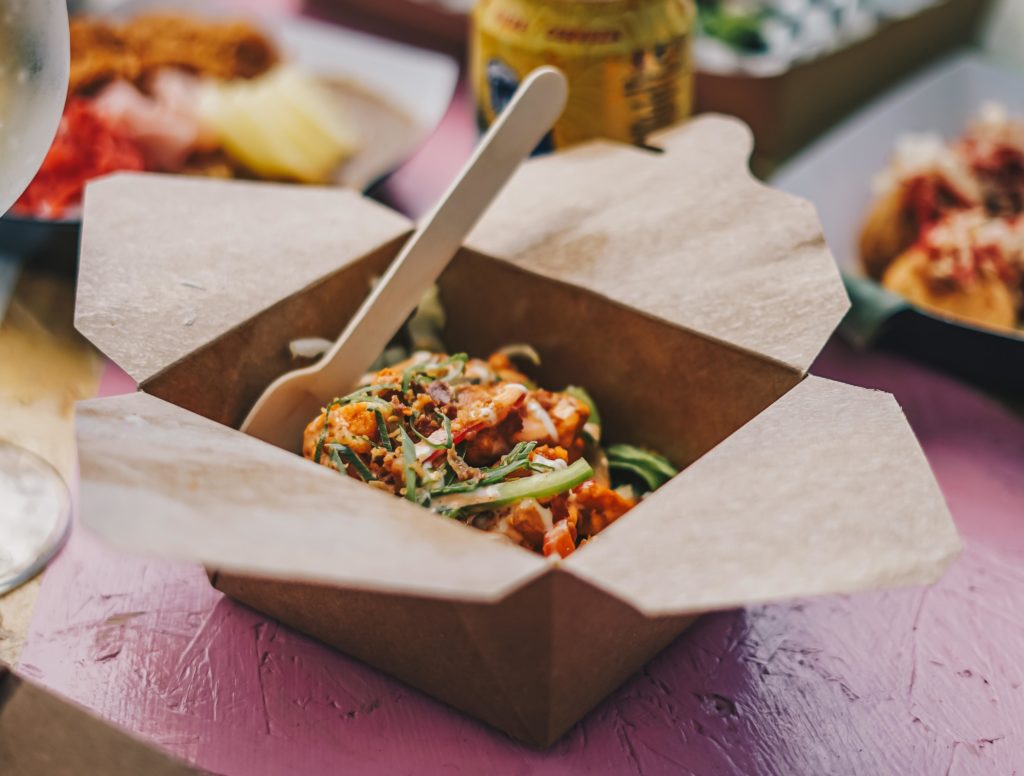
Compostable food service ware like plates, bowls, cups, takeout containers, and utensils are popping up in many restaurants, employee cafeterias, office pantries, and at events. They are often identifiable with the BPI (Biodegradable Products Institute) compostable or a “100% compostable” label and are advertised as a better option for the planet. So should your business make the switch?
First, if you are considering compostable food service ware and other products, it means that you are actively looking for ways to reduce waste and be more sustainable. That is already a good business decision.
Compostable foodware options are getting better every day. When produced from responsible and natural materials, and disposed of correctly, compostable ware can do what it is supposed to do–breakdown in a condensed period of time. While that is a better option than single-use plasticware, it is not the perfect solution to your waste problem. Here’s what you should know to help you make the right decision.
Compostable Food Service Ware Is Not Always Diverted
Just because something is labeled “compostable” does not mean it will be diverted from the landfill or incineration.
Many compostable products require a specific set of conditions to break down, including very high temperatures that are only available at an industrial composting facility. Currently, many areas lack access to industrial composting facilities.
When compostable products end up buried in landfills, they remain there for a long time, potentially even for hundreds of years. Landfills are packed tightly, and do not provide the right environment for composting, such as the need for oxygen.
Is your business located in an area with industrial composting facilities? If the answer is no, all that compostable foodware will most likely end up in the landfill.
Compostable Products Are Not Recyclable, May Contaminate
Compostable products are not recyclable. But, in part because many look and feel like plastic, they may be confused with plastic containers, and get placed mistakenly into recycling bins, where they do not belong. When that happens, they can “contaminate” recyclables and lead to those materials being sent to the landfill. This may increase, rather than decrease, your waste.
Remember, education is always an important part of any recycling or organics program. Your staff and tenants must know what goes where.
Compostable Food Service Ware May Increase Confusion and Waste
As compostable products are a response to our throw-away culture, they do raise awareness about our growing single-use waste problem, and our efforts to counter it. This is a good thing.
However, they can also create confusion, with some people treating recyclable and compostable items the same way, as discussed above. Moreover, compostable products do nothing to slow down our reliance on single-use materials, and at worst, give people a false sense that they are doing something environmentally friendly, just like wishcycling, which is the act of putting something into the recycling bin and hoping it gets recycled, even if it is not recyclable.
The best way to avoid confusion? Move away from single-use compostable or recyclable products to reusable food service ware. If this is possible for your business, it is the best option to really reduce waste and make an impact.
Compostable Products May Be Better, Or Worse, Than What You Are Replacing
According to the Center for Environmental Health, if you are deciding between types of disposable foodware, in terms of what is best for the planet and health, they suggest first looking “for items that are compostable, recyclable, and lastly biodegradable.”
They explain it this way: “Compostable items, if properly disposed of, will break down completely and can then be used to grow more resources. Recyclable items can be turned into raw materials that can then be used to make new things without needing to create completely new resources. And finally, biodegradable options will eventually break down, but we don’t know when and there is no plan to use them for any additional benefit.”
So when deciding if your business should switch to compostable products, look at what they will be replacing.
If your business has access to proper industrial composting facilities, using compostable products may be better than using products that are simply labeled as recyclable. But there is really no perfect replacement for single-use products, other than eliminating them altogether. If compostable food service ware are a must for your business, prioritize compostable products that are uncoated and made with rapidly renewable resources like bamboo.
Mini Case Study: Compostable Food Service Ware vs. Durables
Recently, Great Forest consultants performing a walk through of a client’s business campus noticed a large variety of compostable products offered for use in their pantries and cafeterias. Further investigation revealed that the company was not only NOT reducing waste or increasing their diversion rate with this switch, they were also not saving money.
Why? The main reason was that the business was replacing reusable plates, bowls, cups and utensils with compostable food service ware.
The company was storing durable service ware out of reach from occupants, and were instead buying and restocking compostable versions (which are often more expensive than their recyclable counterparts) in accessible areas, such as drink and snack stations. In this instance, they were heading in the wrong direction of the Zero Waste hierarchy
Should Your Business Use Compostable Food Service Ware? Use This Checklist To Find Out:
1) Ask this question first:
Is it possible to remove single-use products from your operations altogether? Eliminating single-use, disposable products is always the best option. Use durable ware whenever possible. Take a look at the Zero Waste hierarchy. Organics diversion like composting lies somewhere in the middle, with reduce and reuse near the top. The lesson is that to make an impact on waste, we need to think of ways to reduce waste in the first place. And that includes reusing products that are already in the loop. By reusing a product, you are keeping it from the landfill, and contributing to resource conservation.
2) What will the compostable food service ware be replacing?
If your business already uses durable, reusable foodware, the use of compostable plates, bowls and cups might just be increasing your waste. On the other hand, using compostable food service ware, in some circumstances, could be better than using items that are recyclable.
3) Are there industrial composting facilities in your area?
… that can take the compostable products you are considering? If not, your compostable products will likely end up in the landfill.
4) Learn what compostable products are made out of
How a compostable product is made determines how it can be disposed of properly. This includes how long it will take to break down, and under what conditions. Some compostable products may still contain toxic chemicals, leave behind microplastics, or take so long to degrade that they are effectively almost forever in our landscape. So choose wisely. Look for uncoated or rapidly renewable materials like bamboo for any compostable products you use.
5) Find out what waste you are generating with a waste audit
For example, if the waste audit reveals your cafeteria is producing a lot of food waste but does not show a lot of single-use foodware in your waste stream, then perhaps the better solution to reduce waste to landfill is to consider an organics program to divert food waste away from landfills through composting, donation of edible, high-quality leftover food, or by other means of organic waste diversion. If you find a lot of single-use recyclables in your waste stream, it might be time for recycling education, or better yet, to consider moving towards using durable, reusable ware.
6) Remember education is a key part of any waste program
Whatever product or program you go with, you need to make sure staff and tenants know what goes where to really reduce waste and be more sustainable.
Photo: Ambitious Studio, Rick Barrett, Unsplash

